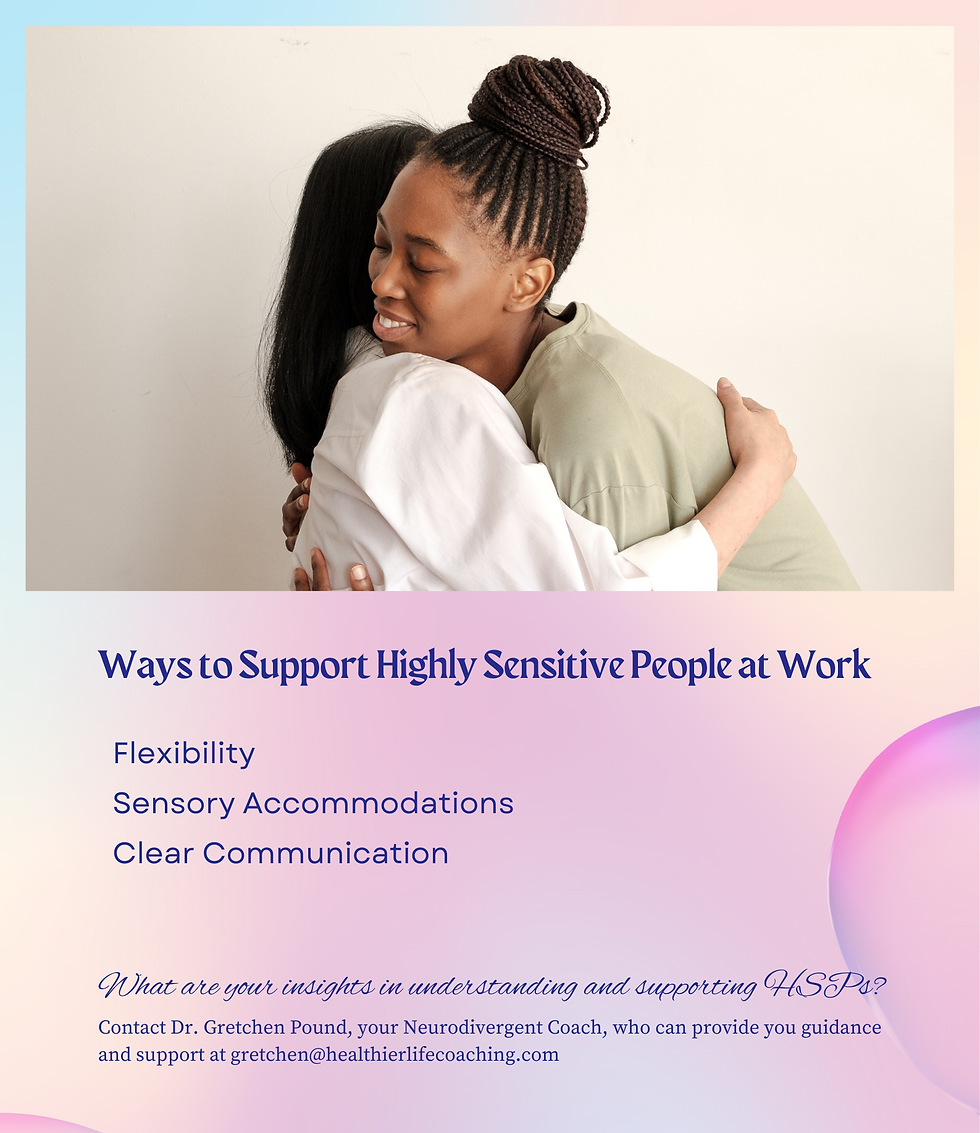The Impact of High Sensitivity in the Workplace: Understanding Highly Sensitive People
- Gretchen Pound, PhD

- Nov 3, 2023
- 3 min read

The workplace is a diverse and dynamic environment where people with various personalities, temperaments, and sensitivities come together to achieve common goals. Among the workforce, there exists a group of individuals known as Highly Sensitive People (HSPs) who have unique qualities and challenges. In this blog, we'll explore how highly sensitive people are affected at work and offer insights on how employers and colleagues can create a more inclusive and supportive work environment.
Understanding Highly Sensitive People
Highly Sensitive People, as coined by psychologist Dr. Elaine Aron, are individuals who have a more heightened central nervous system, making them more perceptive to stimuli in their environment. This heightened sensitivity means that they often experience things more intensely, including emotions, sensory input, and social interactions. It's important to note that being a highly sensitive person is not a disorder but rather a personality trait.
How High Sensitivity Affects Work
Overstimulation: Highly sensitive people can become easily overwhelmed by a barrage of sensory input, such as bright lights, loud noises, or crowded spaces in the workplace. This overstimulation can lead to stress, anxiety, and reduced productivity.
Emotional Reactivity: HSPs are more attuned to their own emotions and the emotions of others. While this can be an asset, it can also lead to heightened emotional reactions to workplace stressors, interpersonal conflicts, or even routine feedback.
Attention to Detail: Highly sensitive people often excel in jobs that require attention to detail, such as quality control, editing, or data analysis. However, this intense focus can sometimes slow down their work processes, which may not align with the fast-paced nature of some workplaces.
Empathy and Teamwork: HSPs are often highly empathetic and make great team players. They can sense the needs and feelings of their colleagues, making them excellent collaborators. However, their empathetic nature can also lead to absorbing the stress and emotions of those around them, which can be emotionally draining.
Decision-Making: Highly sensitive individuals may struggle with decision-making due to their propensity to overthink and anticipate potential outcomes. They may require additional time to weigh options and make choices, which might not always align with tight deadlines in some workplaces.
Supporting Highly Sensitive People at Work
Flexibility: Employers can offer flexible work arrangements when possible, allowing HSPs to control their environment and reduce overstimulation. This could include options like remote work, flexible hours, or designated quiet spaces in the office.
Sensory Accommodations: Employers should consider making adjustments to the workplace environment, such as reducing fluorescent lighting, providing noise-canceling headphones, and minimizing clutter.
Clear Communication: Colleagues and managers can engage in open and empathetic communication with HSPs. Discussing expectations and providing constructive feedback can help reduce anxiety and uncertainty.
Recognize Strengths: Highly sensitive people bring valuable strengths to the workplace, including attention to detail, creativity, and empathy. Employers and colleagues should recognize and celebrate these qualities.
Stress Management Support: Providing access to stress management resources like counseling, mindfulness training, or employee assistance programs can help HSPs cope with workplace stressors.
Conclusion
Understanding and accommodating highly sensitive people in the workplace is essential for fostering a more inclusive and supportive work environment. By recognizing their unique qualities, addressing their challenges, and providing the necessary support, employers and colleagues can create a space where HSPs can thrive, contribute their strengths, and feel valued as part of the team. Ultimately, a more inclusive workplace benefits not only highly sensitive individuals but the organization as a whole through increased productivity, creativity, and collaboration.



